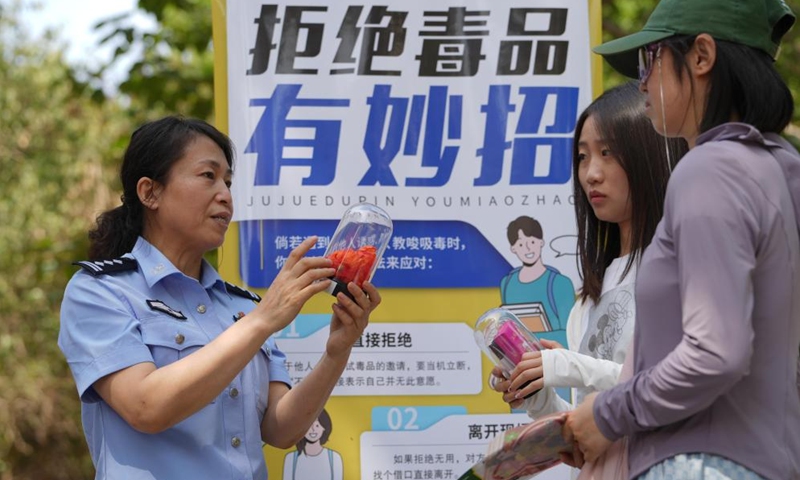
Photo: Xinhua
Editor's Note:
China has carried out extensive and in-depth counternarcotics cooperation with the US. However, despite this fact, the US has blamed China for the prevalence of fentanyl on US soil, a move that undermines China's goodwill and the cooperative atmosphere between the two countries. How should the US view its own crisis? What efforts has China made in the anti-drug fight? The Global Times collects opinions from Chinese and American scholars to discuss this issue. This is the third installment of the series.
In the face of the worsening global drug crisis, China, as a responsible major power, actively supports and participates in the creation of a global anti-drug system under the framework of the United Nations International Drug Control Conventions. Additionally, China proactively promotes the institutionalization of anti-drug cooperation through bilateral, multilateral and regional mechanisms. In doing so, China contributes its experience, solutions and strength to the global governance of drug-related issues, fulfilling its responsibilities as a major power and embracing its duty for the future of humanity.
China is a major contributor to global drug control efforts, maintaining a zero-tolerance attitude toward drugs and actively managing the risks of drug problem resurgence. The country strengthens border control and the management of precursor chemicals, deepens the regulation of fentanyl and new psychoactive substances and prevents controlled chemicals from entering the drug production chain through international trade. Additionally, China conducts comprehensive drug prevention campaigns and continues to enhance treatment and assistance for drug addicts.
China is a key supporting country of the current global drug control system. It is a strong supporter and signatory of the three cornerstone treaties of the current United Nations global drug control system: the amended Single Convention on Narcotic Drugs of 1961, the Convention on Psychotropic Substances of 1971, and the United Nations Convention against Illicit Traffic in Narcotic Drugs and Psychotropic Substances of 1988. As one of the five permanent members of the United Nations Security Council, China actively supports the UN-led international drug control efforts at multiple levels, contributing wisdom and strength to the global fight against drugs.
China is a key promoter and practitioner of institutionalized bilateral, multilateral and regional drug control cooperation. In the face of drugs as a "global enemy," China places great importance on collaborating with drug-producing, transit and consuming countries. Through economic assistance and drug control officer training programs, China supports opium poppy eradication and crop substitution initiatives in source countries. Additionally, through information exchange and joint law enforcement actions, China works vigorously to combat the illegal production, manufacture and trafficking of drugs. At the same time, the Chinese government actively promotes regional drug control cooperation through various platforms, striving to institutionalize cooperation. By endorsing member states' drug control strategies and implementing action plans, China plays a significant role in addressing the global drug threat and contributing to the creation of a drug-free society.
Starting in 2019, the Chinese government took an innovative step by officially scheduling all fentanyl-related substances. In 2021, China extended this approach to all synthetic cannabis-related substances and other new psychoactive substances. Demonstrating the responsibility of a major global power, China has shaped the future of drug control through intelligent governance, becoming the first country to put all fentanyl-related and synthetic cannabis-related substances under control.
China implemented "classification-based control" over fentanyl-related substances and synthetic cannabinoids. This approach enhances the drug control legal framework, providing strong legal support for combating and punishing crimes related to new types of drugs. Furthermore, it contributes to global efforts in addressing the illegal production, trafficking and abuse of these substances, showcasing China's role in tackling the global drug crisis.
China is the country with one of the world's most extensive lists of scheduled drugs and the strictest control over precursor chemicals in the world. Additionally, China has implemented classification-based control over fentanyl-related substances and synthetic cannabinoids. The Chinese government vigorously enforces anti-drug policies, steadfastly follows a drug governance path with Chinese characteristics, and is determined to modernize its drug control system and governance capabilities, contributing Chinese wisdom to global drug control efforts and sustainable development.
The author is director of the International Center for Drug Control Policy Studies at Shanghai University. opinion@globaltimes.com.cn




